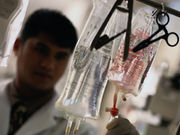Significant trend for consumption of carbapenems and resistance to imipenem in P. aeruginosa
TUESDAY, Aug. 16, 2016 (HealthDay News) — Antimicrobial resistance to carbapenems has increased, and consumption of antibiotics, especially carbapenems, is associated with antimicrobial resistance of Pseudomonas aeruginosa, according to a study published online Aug. 11 in the Journal of Clinical Pharmacy and Therapeutics.
Snezana Mladenovic-Antic, from the University of Nis in Serbia, and colleagues examined the correlation between antimicrobial usage and bacterial resistance of P. aeruginosa over a 10-year period. Antibiotic utilization was recorded, expressed as defined daily doses per 100 bed days.
The researchers identified a significant increasing trend in imipenem and meropenem resistance (both P < 0.05). There was a significant correlation between aminoglycoside consumption and amikacin and gentamicin resistance (both P < 0.01). The correlation between carbapenem consumption and resistance to imipenem in P. aeruginosa was significant (P < 0.01), while there was a trend toward resistance to meropenem (P > 0.05). The correlation between use of all beta-lactam and P. aeruginosa resistance to carbapenems was very good (P < 0.01 for imipenem and P < 0.05 for meropenem).
“Our data demonstrated a significant increase in antimicrobial resistance to carbapenems, significant correlations between the consumption of antibiotics, especially carbapenems and beta-lactams, and rates of antimicrobial resistance of P. aeruginosa to imipenem and meropenem,” the authors write.
Copyright © 2016 HealthDay. All rights reserved.








